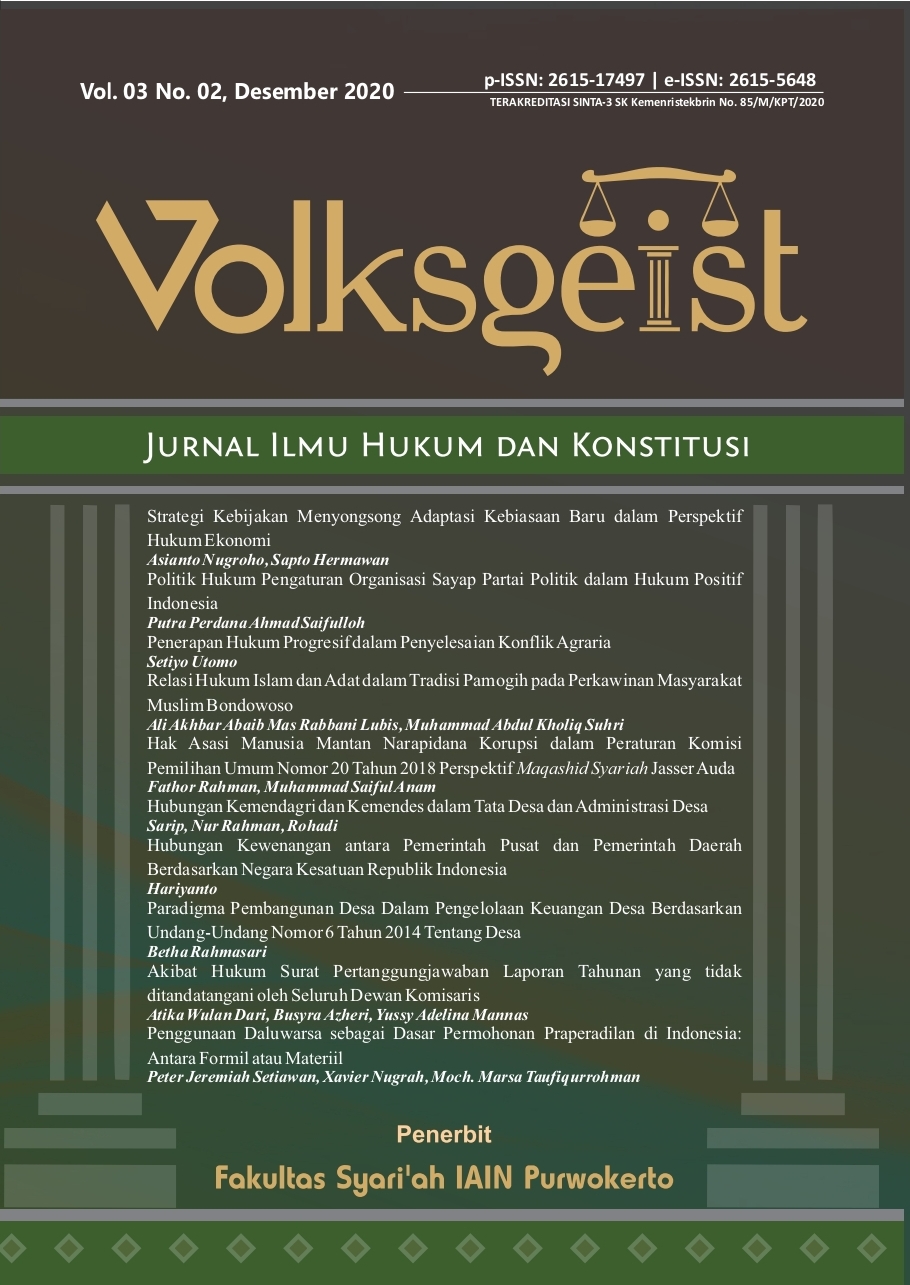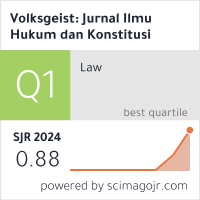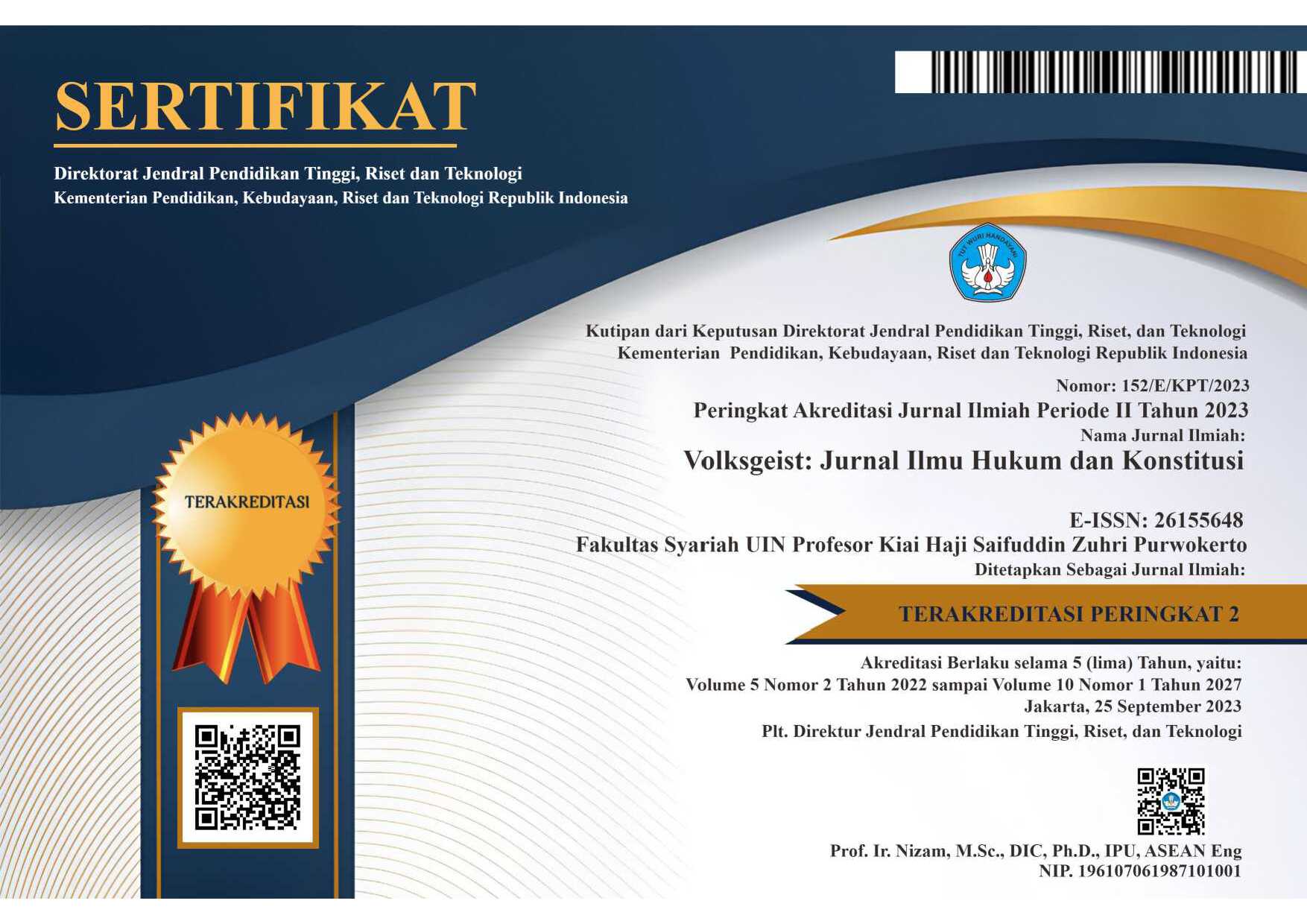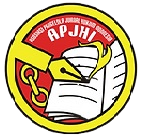Paradigma Pembangunan Desa dalam Pengelolaan Keuangan Desa Berdasarkan Undang-Undang Nomor 6 Tahun 2014 Tentang Desa
DOI:
https://doi.org/10.24090/volksgeist.v3i2.4063Keywords:
Development paradigm, village financial managementAbstract
This article aims to find out the developmentidea or paradigm through village financial management based on Law Number 6 of 2014 concerning Villages. In this study, the researcher used a normative research methodby examining the village regulations in depth. Primary legal materials are authoritatuve legal materials in the form of laws and regulations. Village dependence is the most obvious violence against village income or financial sources. Various financial assistance from the government has made the village dependent on financial sources from the government. The use of regional development funds is intended to support activities in the management of Regional Development organizations. Therefore, development funds should be managed properly and smoothly, as well as can be used effectively to increase the people economy in the regions. This research shows that the law was made to regulate and support the development of local economic potential as well as the sustainable use of natural resources and the environment, and that the village community has the right to obtain information and monitor the planning and implementation of village development.Downloads
References
Basri, Yuswar Zainul, dan Mulyadi Subri. Keuangan negara dan analisis kebijakan utang luar negeri. Cet. 1. Jakarta: RajaGrafindo Persada, 2003.
Dharmawan, Arya Hadi. Konflik-konflik keuasaan dan otoritas kelembagaan lokal dalam reformasi tata-kelola pemerintahan desa: investigasi teoretik dan empirik. PSPP IPB, 2006. http://repository.ipb.ac.id/handle/123456789/45073.
Fatkhurohman. Pengaruh Otonomi Daerah Terhadap Hubungan Pusat Dan Pemerintahan Daerah Di Bidang Regulasi Untuk Menangani Peraturan Daerah (Perda) Bermasalah, 2010.
Isharyanto, dan Dila Eka Juli Prasetya. Hukum keuangan desa: mencari keseimbangan kewenangan pemerintah kabupaten/kota dan desa. Yogyakarta: Deepublish, 2017.
Jafar et al. - KETAHAHANAN MASYARAKAT DESA.pdf, t.t.
Kansil, C.S.T. Desa kita dalam peraturan Tata pembangunan desa. Jakarta: Ghalia Nasional, 1983.
Mahfud MD", Moh. Membangun politik hukum, menegakkan konstitusi. Jakarta: Rajawali Pers, 2010.
Mardiasmo. otonomi dan manajemen keuangan daerah. Yogyakarta: ANDI, 2004.
Paat, Evicka, Frans Singkoh, dan Yurnie Sendow. “PERANAN KEPALA DESA DALAM PERENCANAAN PEMBANGUNAN DI DESA PONTAK KECAMATAN RANOYAPO, no. 2 (2017): 9.
Ridwan, H. R. Hukum administrasi negara. Jakarta: RajaGrafindo Persada, 2006.
Sairin, Sjafri. Perubahan sosial masyarakat Indonesia: perspektif antropologi. Cet. 1. Yogyakarta: Pustaka Pelajar, 2002.
Santoso, Purwo. Pembaharuan desa secara partisipatif. Jakarta: pustaka pelajar, 2003.
Solekhan, Moch. Penyelenggaraan pemerintahan desa berbasis partisipasi masyarakat. Edisi revisi, Cetakan pertama. Malang: Setara Press, 2014.
Suharto, Didik G. Membangun Kemandirian Desa. Yogyakarta: Pustaka Pelajar, 2016.
Suwondo, Kutut. Demokratisasi Di Pedesaan Dalam Rangka Pelaksanaan Otonomi Lokal. DPRD kabupaten Semarang Ungaran, 28 Februari 2000. https://id.scribd.com/doc/69395997/Demokratisasi-Di-Pedesaaan-Dalam-Rangka-Otonomi-Daerah-Kutut-Suwondo.
teori pembangunan.pdf, t.t.
Toupin, J., dan G. Lamoureux. Coelomocytes of Earthworms: The T-Cell-like Rosette. Cellular Immunology 26, no. 1 (September 1976): 12-32. https://doi.org/10.1016/0008-8749(76)90355-5.
Zaini, Helmy Faishal. Gerakan Membangun Desa. Republika. 22 Januari 2011.
Downloads
Published
How to Cite
Issue
Section
License
Copyright (c) 2020 Betha Rahmasari

This work is licensed under a Creative Commons Attribution-ShareAlike 4.0 International License.
Copyright Notice
Authors who publish with this journal agree to the following terms: Authors retain copyright and grant the journal right of first publication with the work simultaneously licensed under a Creative Commons Attribution-ShareAlike 4.0 International License that allows others to share the work with an acknowledgment of the work's authorship and initial publication in this journal.











